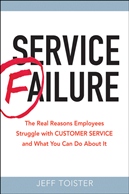CBS has a new reality show called Undercover Boss, where the head of a major corporation goes undercover as a frontline employee to get a ground-level view of the organization. If the first episode is any indication, the executives featured in this show will be incredibly detached from their organizations, use their undercover stint as an excuse to create chaos, and highlight enough dirty laundry on national television to make you cringe. And, because it’s television, we’re sure to see a lot of happy endings.
Spoiler alert – watch the first episode before reading further if you don’t want anything revealed before you’ve seen it.
http://www.cbs.com/primetime/undercover_boss/
Episode 1: Waste Management's Larry O’Donnell
Waste Management’s President and COO, Larry O’Donnell, is the featured executive in episode one. He tries out five different frontline jobs and the employees assigned to show him the ropes apparently have no idea he’s really an executive with the company. I admire him for putting himself out there and letting a television show get such an intimate look at his organization. He seems to have his heart in the right place and wants to do right for his employees, but his ego and apparent detachment from reality are a bit stunning.
Oh so detached
At the beginning of the program, Larry is enthusiastic about the opportunity to visit some of Waste Management’s operations. He tells the audience, “I may be able to revolutionize some of our processes.” Attention executives: You don’t need to be on a reality show to go visit your operations and see what’s really happening! Go ahead and spend some time out in the field. Feel free to revolutionize processes that need revolutionizing even before the cameras start rolling.
The good news is Larry had his eyes opened by what he saw throughout the show. It was particularly interesting to see his reaction to the human toll of the cost cutting measures he had spearheaded at Waste Management. Like many executives, Larry has a super hero alter-ego. When he saw how budget cuts were affecting real people, he undoubtedly said to himself, “This looks like a job for Captain Meddler!”
Captain Meddler
Ugh, Larry. Ugh.
Jeff Richardson manages one of the locations where Larry goes undercover. He has made the best of Larry’s cost-cutting measures and runs an efficient operation with a motivated team. One of Jeff’s employees, Jaclyn, appears to be an incredibly committed employee who is capably handling multiple responsibilities due to the cut-backs. Jeff should be praised for keeping his team motivated through lean times.
Enter Captain Meddler. Larry spends a day with Jaclyn and is taken aback by her work ethic and dedication. He’s amazed when she invites him to have dinner with her family, and is surprised to learn that Jaclyn is supporting her extended family and has trouble making ends meet on her salary. The next day, Larry meets with Jeff and tells him he’d like to see Jaclyn get promoted and make more money.
On one hand, it’s great to see the big boss recognize an employee’s contributions and want to reward her for them. It certainly seems well-deserved on Jaclyn’s part. On the other hand, you never see Larry give Jeff any credit for making the most out of the meager resources that Larry himself had provided. It’s great that Larry has a new perspective once he’s glimpsed the people behind the numbers, but it’s ridiculous to see him march in to Jeff’s operations and try to come off as some sort of savior.
It’s a bit sad that it’s not an uncommon tale in corporate America. The middle manager gets squeezed.
Cringe TV
There were some outstanding moments in this show that I hope is a sign of more things to come. My top three:
3. The boss can’t cut it.
One of the jobs Larry tries out is picking up trash. At the start of the day, Larry asks his supervisor, Walter, for some tips. Walter’s response was pure gold: “What kind of technique do you want? You’re just picking up paper!” By the end of the day, Walter informs Larry that he’s just not cut out for picking up trash.
2. Pay docking scheme.
On another job in a recycling center, Larry and his supervisor for the day are sitting in the lunch room when she suddenly jumps up and runs to the time clock. She clocks in from lunch and then walks back to the lunch room and continues eating. Apparently, the site manager has a scheme where he docks workers two minutes of pay for every minute they are late. This whole scene is wrong on many levels, which is precisely why I like it.
1. The pee can.
The best of them all was Larry’s stint on a trash collection route. Janice, the driver working with Larry, tells him she isn’t given the opportunity to take bathroom breaks along her route, so she keeps a coffee can in the truck. She hands it to Larry and says, “That’s our little pee pot!” Yup. I'm so glad the editors and the lawyers let that gem through!
OK, so there's still a happy ending and Larry's definitely not an ogre. By the end of the show, he tries to do right by his employees and tells the team he has a new perspective. I just hope the next episode is just as good!
 Jeff Toister
Jeff Toister  Thursday, February 11, 2010 at 10:59AM |
Thursday, February 11, 2010 at 10:59AM | 


